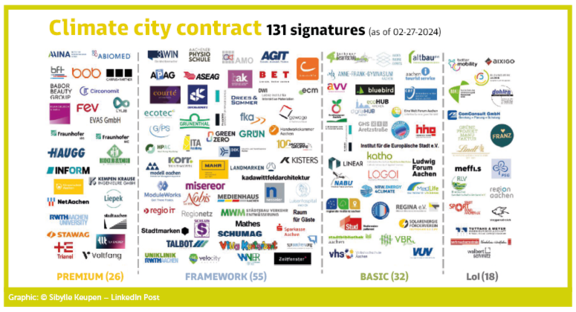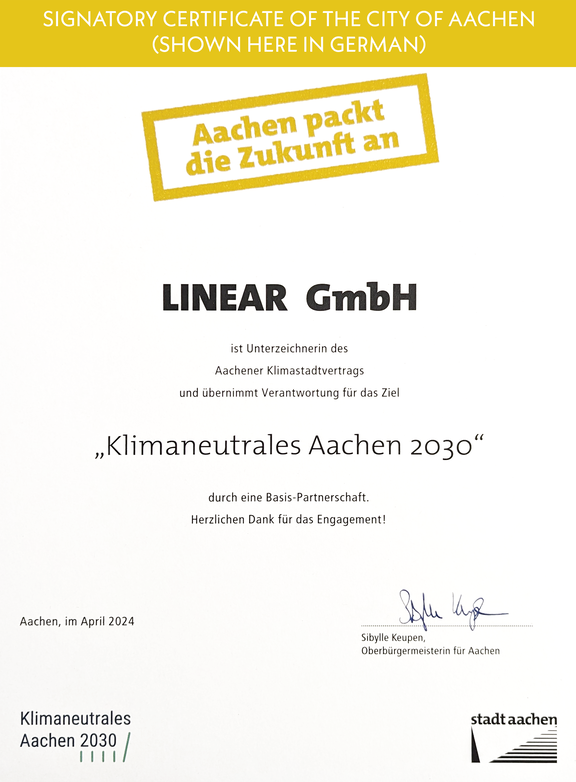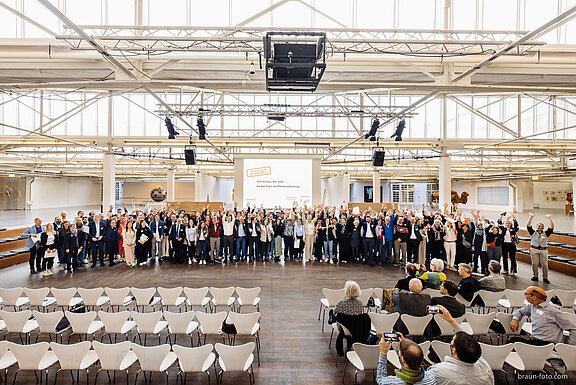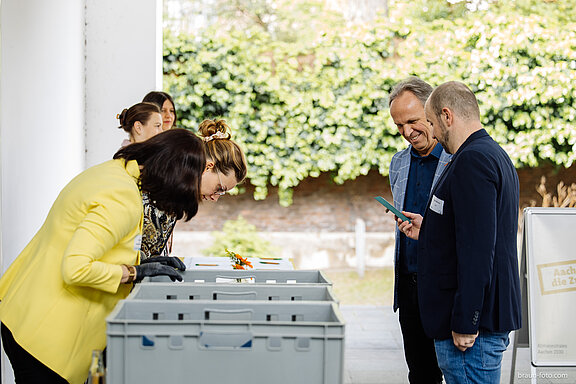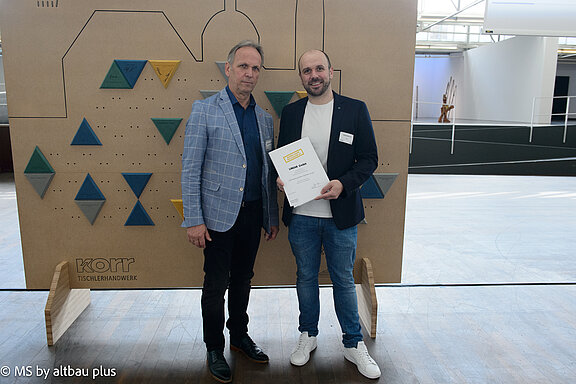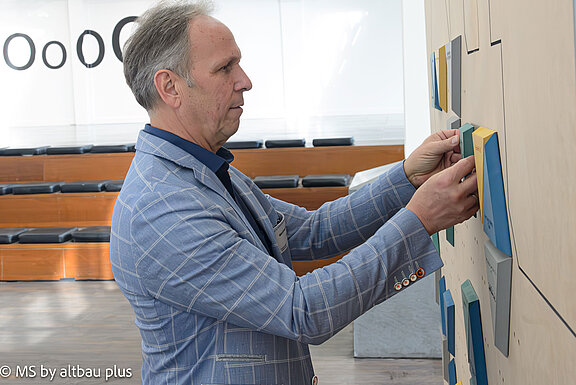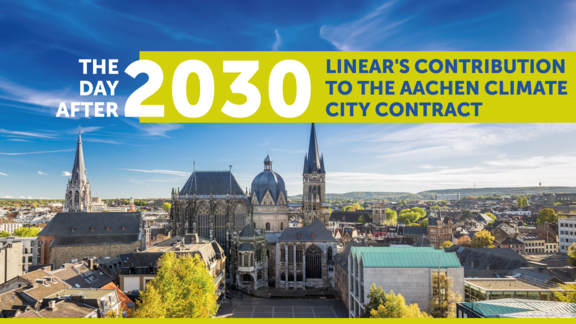
Image: © engel.ac - stock.adobe.com
Let's start at the beginning
If you have been following the news in recent years, one thing is easy to recognise - extreme weather conditions such as heavy rainfall, flooding or heatwaves are also occurring more frequently in our region. Landslides, droughts, rising sea levels, ocean acidification, a reduction in biodiversity and rapid climate change can be seen globally. The fact is that climate change affects us all, which is why we need to work together to find realistic solutions to counteract these changes. Both the "Federal Climate Protection Act (KSG)" and the "European Climate Act" define climate neutrality by 2050 – this applies to both Germany and the European Union (EU). Neutrality is necessary in order to limit the global temperature rise to 1.5 degrees Celsius – a threshold set by the Intergovernmental Panel on Climate Change based on scientific findings and assessments in order to minimise the potentially catastrophic effects of more severe climate change. This target is also set out in the Paris Climate Agreement, which was signed by 195 countries, including the EU.
But what does this have to do with the city of Aachen?
Aachen is a pioneer - in north rhine-westphalia, in Germany and in Europe. The climate protection targets were adapted to the current global situation by council resolution on 22nd January 2020. Aachen is the first city in Germany to take into account its share of the remaining greenhouse gas budget in order to keep global warming below 2 degrees Celsius – preferably 1.5 degrees Celsius – in accordance with the Paris climate targets. This leads to the ambitious goal of climate neutrality by 2030. Neutrality is achieved when a balance is established between carbon emissions and the absorption of carbon from the atmosphere. This means that in 2030, Aachen will not release more greenhouse gases than are offset by carbon sequestration.

An ambitious goal – but what does realistic implementation look like?
The city of Aachen is actively involved in the EU mission "100 Climate-Neutral and Smart Cities by 2030" and has been selected to act as a role model for European cities. In order to ensure a structured, prioritised and measurable implementation of the goal, the so-called "Climate City Contract" is an important tool for achieving the goal. This is a catalogue of measures that is updated on a cyclical basis. The revised version of the Aachen city administration's climate protection concept served as the basis. However, it became clear as early as the drafting stage that various fields of action and the associated risks must be considered and actively developed in order to achieve this goal. The agenda provides for the following fields of action:
1. Energy-efficient building refurbishment and the expansion of renewable energies
The expansion of photovoltaic systems in particular is expected to lead to a high reduction in CO2 emissions. However, the financial aspect and concerns about the load-bearing capacity of roof structures can lead to obstacles to realisation.
2. Electrification of space and process heating
In particular, the reformation of historically grown processes and the availability of high-temperature heat pumps represents a challenge that needs to be overcome with innovative solutions.
3. Material and process efficiency
This field of action can only be optimised in cooperation with industry. A willingness to develop process efficiency, taking into account the conservation of resources, should be emphasised here. Companies should be encouraged to rethink their processes and organise them more efficiently.
4. Hydrogen as a substitute for fossil fuels
This option is still viewed critically, as the uncertain availability and high costs must be considered. However, the city of Aachen is planning to improve availability and incentivise its use.
5. Authorisation and planning law
One of the biggest challenges is the adaptation of time-consuming bureaucratic processes. Approval and planning law should be reviewed to speed up processes and minimise obstacles.
6. Financial incentives for companies
Linking property or trade taxes to corporate climate protection measures should motivate companies to develop CO2 reduction strategies. Cooperation between business, politics and administration is seen as the key to success.
7. Communication and awareness-raising
Increased and transparent communication about ways to achieve climate neutrality should stimulate enthusiasm and motivation among the population to get involved. A new concept for the communication strategy is to be developed. The aim is to highlight the wide range of options for action, inspire and raise awareness of the urgency of climate neutrality.
8. Shortage of skilled labour and education
In view of the constantly growing shortage of skilled labour, a broad awareness campaign will be launched to raise interest in training skilled workers in the field of sustainable technologies.
9. Digital transformation
The aim is to achieve a comprehensive digital transformation in order to support the climate targets. From digitalisation in the transport sector to the transparent design of the heating transition, digital instruments are seen as crucial tools.
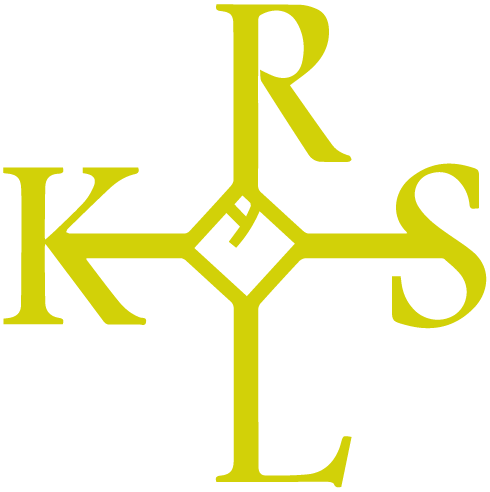
Conclusion: It became clear during the development of the climate protection concept of the city administration of Aachen and the compilation of the fields of action, that the goal of climate neutrality by 2030 cannot be achieved by the city alone, but only through an interdisciplinary approach. We are all called upon: companies, institutions, industry, services, business, science, sport, culture, initiatives, interest groups and civil society. We must all make our contribution, bindingly and as a team. The available resources must be utilised efficiently and purposefully, taking into account the opportunities and risks. The 30 years of experience in climate protection work, the committed city administration, which is increasingly committed to environmental protection, the presence of universities, research institutions and start-ups, as well as transparent communication, make the city of Aachen optimistic about achieving this ambitious goal.
What does this have to do with LINEAR GmbH?
For us at LINEAR, our commitment to social and sustainable projects is a matter close to our hearts. For this reason, we support social organisations (you can also read our blog post on the "LINEAR Christmas donations 2023") and also make our contribution to CO2 neutrality and waste avoidance. As a company based in Aachen, we want to actively take responsibility to help preserve a planet worth living on for current and future generations. To support the city of Aachen in implementing effective and targeted climate protection, we have made a commitment together with 131 other companies (as of 27th February 2024). In our case, we have positioned ourselves as a "basic partner", which means that we are on hand to advise the city of Aachen. This includes providing our experience with regard to CO2 reduction measures we have implemented ourselves to enable other institutions to consider or even implement them.
As a software company with 30 years of experience, we have not only experienced the changes within our field of activity and the construction industry at first hand, but have also actively helped to shape them. Our field of activity focuses on MEP optimisation. Our primary goal is to continuously develop our extensive product portfolio for the design and calculation of MEP.
In close co-operation with design and planning offices, construction companies, trade and industry, we are always up to date. This not only provides our customers with user-friendly tools for complex processes, but also solutions that meet the dynamic and sector-specific requirements of the fast-moving construction industry and thus enable the development of sustainable buildings.
In addition to the cooperation with our partners, the exchange of experience with our customers offers a further source of development potential. Be it realised reference projects, especially with a focus on sustainability and climate protection (please also note the two articles "5,000 m³ large buffer storage tank to make Fuchstal energy self-sufficient" by Hans van Bebber and "Key contributions of MEP in the life cycle assessment of buildings" by Carina Hollenbeck and Ines Naumann) or the exchange with the LINEAR community via the Idea Channel, for example. We gain new perspectives and impulses to make our software solutions even more efficient and prepare them for current and future challenges.

But we also want to take responsibility outside of our day-to-day business. For example, we are actively working to reduce our own carbon footprint by raising awareness among the entire workforce and investing in sustainable concepts at our headquarters in Aachen (e.g. the installation of a photovoltaic system in 2023 and the gradual conversion of our vehicle fleet to electric vehicles).
In cooperation with our partner everwave, we offset waste every year based on all of our employees and their family members living in the same household. Plastic packaging waste per inhabitant per year in Germany now amounts to 41.09 kg (source: de.statista.com/themen/4645/plastikmuell/). In 2022, this was still 38 kg per head. This was the benchmark for the waste collection campaign, which was gathered per employee and per household member from the waters of everwave. As a company, we were able to directly support this waste collection campaign with plastic credits. Further information can be found on the website of everwave if this campaign has aroused your interest.
Last year, we entered into another cooperation with the Cologne-based eco start-up Planted. With their support and the software specially developed by Planted, we recorded our in-house life cycle assessment, which defines our in-house CO2 hotspots. The TÜV-certified "all-in-one sustainability platform" analyses various areas: from the vehicle fleet and external and internal events to company equipment, waste separation and the coffee we buy – to name just a few. The data collection highlights the relevant hotspots, which can now be actively reduced. The main advantage of this platform is that the entire workforce can actively participate in reduction measures, as the analysis is transparently available to all employees within the software. Based on our identified hotspots, the software suggests solutions for reducing CO2, but employees can also set their own campaigns or challenges in which they can participate. Is your commute a CO2 hotspot that could be reduced? Then call out a challenge to cycle or take the bus for a week! It's easy and, above all, not forced. The founders and the team behind Planted have a clear vision: to get people excited about climate protection. Their approach is inspiring, positive and hopeful. Because even if climate change is our greatest threat, it is not too late to take action together and decide in favour of the future. Planted also offers tree planting campaigns and the management of its own company forest. Not only does this promote climate protection in Germany, it can also generate team-building measures - and who can claim to have their own company forest that they can not only visit, but also see how the trees they have planted themselves are doing via Google Maps coordinates? Here is another important note: For small and medium-sized companies, the preparation of a life cycle assessment is still voluntary. For large companies and corporate groups, a detailed audit may become mandatory in the future based on the number of employees and/or annual turnover. If you have any questions, Planted will be happy to advise you. Further information about Planted can be found at www.planted.green.de.
This expertise enables us to be available to the city of Aachen and share our wealth of experience in reducing CO2 emissions. Climate protection starts with all of us and just because these measures have been or are being implemented does not mean that they are sufficient.
In conclusion, we would like to use this article to raise awareness that this issue affects us all and that certain measures can help to promote climate protection. If everyone – whether privately or professionally – makes the best possible contribution for themselves, rethinks their behaviour and possibly finds measures for improvement, we will already be one step further. Without instruction and without obligation. As a company, we are confident that we can overcome this challenge with good ideas and innovations together and in co-operation with the other partners and achieve the goal. Let's tackle it together!
Sources and further information:
- Website of the City of Aachen: www.aachen.de - Klimaneutrales Aachen 2030
- Please refer to the following PDF files on the website of the
city of Aachen for further information:
The factsheet: Factsheet_KlimaneutralesAachen.pdf
The rough sketch: StAC_Klimaneutral2030.pdf
- Information on the process and the objectives of the EU mission: NetZeroCities
- Website everwave: www.everwave.de
- Website Planted: www.planted.green.de
